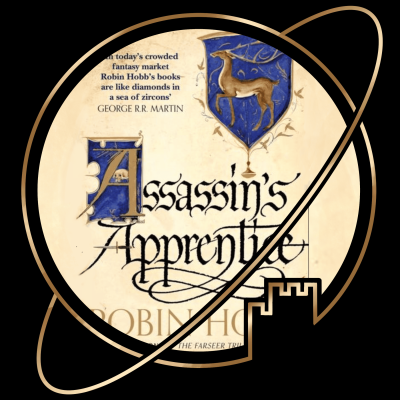- Book written by Robin Hobb
- Published in 1995
- Part 1 of the Farseer Trilogy
- First part of the Realm of the Elderlings Series
As the illegitimate son of the Crown Prince, young Fitz holds a difficult position in the royal court of the Kingdom of the Six Dutchies. He is not publicly acknowledged by his family and so he grows up as a stableboy, while in secret his grandfather King Shrewd has him trained to become an assassin. At the same time, he has to learn to handle the hereditary magic that is part of his bloodline. Threats to the Kingdom, both from outside of its borders and from within, will force Fitz to consider where his true loyalties lie.

When the concept of the Collection was presented to me, I didn’t have any doubts that Robin Hobb’s The Farseer Trilogy would be one of my first contributions. To clarify: I really love these books.
I can still remember the first time I picked up Assassin’s Apprentice. Only ten or eleven years old, recently lured into the fantasy genre by The Fellowship of the Ring movie, I was on a desperate quest in the library to find books to read. It was John Howe’s beautiful yet mysterious cover artwork that first caught my eye: a ship traversing a stormy sea, and a few character portraits. The blurb told me Robin Hobb(it) was heavily inspired by J.R.R. Tolkien. I was sold…
When I started reading, it soon became clear Assassin’s Apprentice was nothing like Tolkien’s stories, but I didn’t care in the slightest. By then, I was already gripped by the desperate setting Robin Hobb presented to me, and I was invested in little Fitz’s struggles to find his way in this harsh world of strange magics and murky moralities.
As the title suggests, Assassin’s Apprentice tells the story of a boy that is groomed as an assassin. However, the plot has more in store than that, despite this book’s relatively concise length. You follow Fitz, a crown prince’s bastard, as he weathers childhood insecurities as well as court politics in a time of cruel invasions. Through Fitz’ eyes, Robin Hobb craftily guides you through an intriguing series of events, a plot with several twists and turns, to leave you with an excellently satisfying ending that at the same time will let you long for more. I will never forget the first time I finished this book, and the delightful jumble of emotions it had unleashed in me.
Finally, I’d like to mention the fact that Assassin’s Apprentice (and its sequels) harbors some extraordinary, lifelike characters, characters you’ll learn to love or hate. I would personally count Fitz, the sole protagonist, as one of the loveable characters.
Luckily, I can confirm that my passion for this book (and trilogy) is based on more than just mere nostalgia. I’ve reread it multiple times in the decennia since then, and I’ve only discovered more things to love. For me, that is an indicator of truly masterful writing, something I gladly recommend to other readers.

I’m about to get into a fight with a bunch of the other curators on this site, but there’s no putting it off anymore: Let’s talk about Robin Hobb.
I’ve read seven of her books, and by now I’m well and truly of the opinion that her writing amounts to a resounding ‘meh’. There are some ups, a lot of downs, and overall her books are just… middle of the road fantasy books about main characters that annoy the [expletive] out of me.
Assassin’s Apprentice is actually one of Hobb’s books that I enjoyed the most out of the ones I have read. The book produces a beautiful little vingette of a keep on a cliff by the shore and the little fishing village around it, of the lives of the people living there, of a child’s adventures on the beach or by the docks. It tells a great story of a kid from elsewhere, struggling to fit into a new world in which he never seems to fully be accepted, of the few relationships he builds (and destroys…) over the course of his teenage years, and the bonds of duty that bind him to his fate.
But boy, did the book also annoy me at times. I have two main peeves with The Realm of the Elderlings, and as the Farseer Trilogy progresses, they will both stand out more and more. The first is that Hobb’s worldbuilding, while not lacking in detail, is both a bit bland and lacking in coherence. She has a tendency to cram a bunch of quite different tropes into the same world – or even the same kingdom – without much care for how they would affect one another (at least in the first six books of the series). It is not much worse than in many other fantasy books, but given that many consider her one of the great ones, it irks me.
The second, far more important problem is that I absolutely loathe Fitz, the main character. Boy, do I not love Fitz. Hobb is one of those writers who chooses to write about main characters that make an almost unrelenting string of mistakes and continually suffer as a result of their own stupidity, stubbornness, or sheer bad luck (Rothfuss is another one of those). Fitz plods through the plot in constant anxiety, self-hate and borderline depression, and as a reader you keep clenching your teeth at how much easier everything in his life could have been if only he could see straight for a second. It makes me – and many people I know – want to throw things.
I have found that there are others who love torturing themselves like this.
You’ll probably know in which of those categories you fall. Do you like characters in constant struggle with themselves and the world who keep on the face of endless adversity? Then go ahead, you’ll like this! Are you a sucker for competent characters with a fatal flaw? Then Assassin’s Apprentice is maybe not for you.
Assassin’s Apprentice is divisive and it is not my style, but I’ll recognise that it is well-written and for some fantasy readers, it is the absolute holy grail. So if you’re in doubt, I’d recommend you give it a go and see if its for you. But if Fitz is not your thing… well, it’ll be one of those that you’ve read to see what the fuss was all about.
If you’re interested in more fireworks, perhaps check out our collection post, where I try to convince a couple of die-hard fans to say something less than positive about their favourite series.

Robin Hobb’s Realm of the Elderling series is one of my favourite Fantasy series of all time, so it is hard for me to judge this first books on its own merits without considering where the story will go in the following books. A lot of what makes the series so great to me is the way you get to follow these characters throughout their lifetime and to see them change from little children to adults, to become parents and even grandparents in time.
In this first book, we meet Fitz when he is just five years old. We are introduced to a lot of great characters who will play an important role in his life. The first book is by far the shortest of the series, and it is relatively fast paced. If you are into epic fantasy I would say: give it a try. If you like what you are reading, there is a lot more to look forward to…
For a more extensive review of this series, read in our Collection Post why Jop and I think it deserves to be added to the collection.













